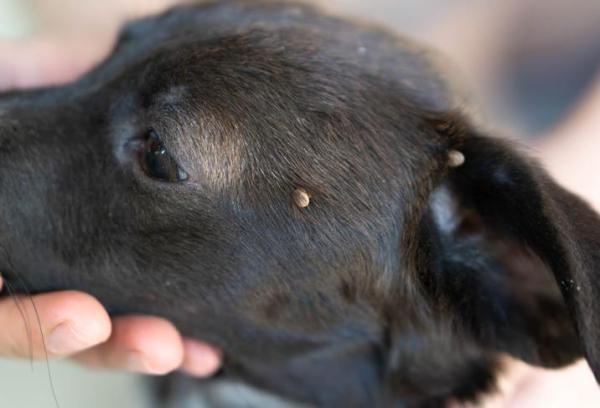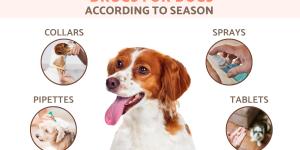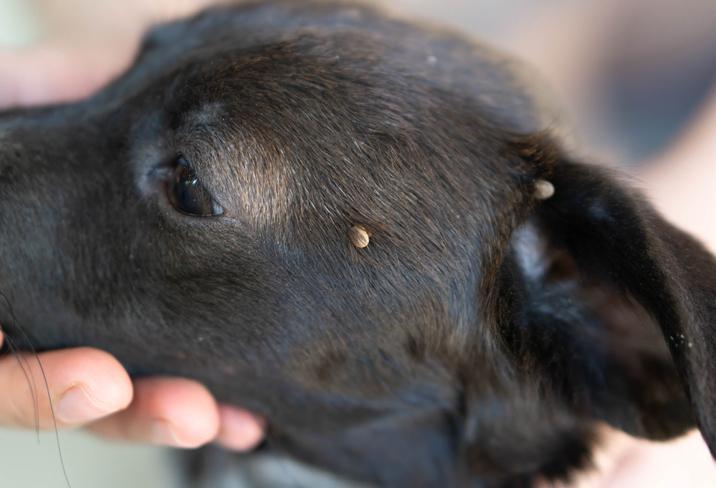Is Permethrin Safe for Dogs? - Guide to Permethrin for Dogs



See files for Dogs
Permethrin is an antiparasitic product that we can find in different formats, such as in sprays, collars, etc. They all share the objective of killing fleas, ticks or mites. In this AnimalWised article, we are going to talk specifically about permethrin in dogs.
We will explain what it is, how it works, what its efficacy is and, above all, we will focus on the precautions that must be taken with its administration and handling to avoid adverse effects. Lastly we will answer the most common question, is permethrin safe for dogs? Keep reading to learn more!
What is permethrin for dogs?
Permethrin is an antiparasitic substance that is used in both human and veterinary medicine. It acts mostly by contact and belongs to the group of pyrethroids, which are broad spectrum synthetic compounds that are used to kill different parasites.
They do this by being analogs of natural pyrethrins that work as insect and mite repellants and are extracted from well-known flowers such as chrysanthemums. Its mechanism of action, both in pyrethroids and pyrethrins, is based on affecting the nervous transmission of certain parasites, to the point of causing paralysis and, finally, death.
This produce has been used since the 1970s, which means that permethrin in dogs is not always as effective as we would like it to be since parasites can develop resistance to it. In other words, sometimes permethrin isn't effective or has low efficacy against parasites.
Bearing this in mind, if we do not observe the desired effectiveness, you must simply contact your veterinarian and ask them to try another treatment. There are many other antiparasitic products that you can use to get rid or fleas, ticks and other parasites common in dogs, such as intestinal parasites in dogs.
Permethrin Uses in Dogs
Permethrin for dogs is used against ticks, fleas, mites, lice, and flies. In other words, this product is used against external parasites. If you're also looking for a product to combat internal parasites, contact your veterinarian and ask which one would be best for your dog.
We have discussed the relationship between synthetic pyrethroids, among which permethrin is found, and natural pyrethrins, but, although their mechanism of action is the same, it should be noted that pyrethrins do not have the same efficacy as pyrethroids. It is worth pointing out so that we take it into account when choosing a suitable and effective product for our dog.
Thus, permethrin will be much more powerful and longer-lasting than natural pyrethrins. These can be used successfully in certain circumstances in which the presence of parasites is minimal, but they will not be used to control infestations.
In addition, they are volatile and lose effectiveness when exposed to sunlight. Being a product considered natural, it is not subject to the same controls as permethrin. This implies that there is no certainty about its use or its effects. On the other hand, permethrin can also be used to sanitize the house.
We can find permethrin for dogs in different formats. Perhaps the most popular and effective are pipettes, but it also appears as an ingredient in necklaces and shampoos or sprays. Ask your veterinarian which would be best for your dog!

Permethrin dosage in dogs
To know the correct dosage for your dog, your vet will need to weigh your dog. With this, they will look at the concentration of permethrin in the product you will administer as it differs form product to product. For example, pipettes can reach concentrations of up to 65%. This means that care must be taken to avoid errors that exceed the recommended dose.
Your veterinarian will indicate the most appropriate guidelines for use, as well as the correct dilution, in the case of shampoos that need it.
Contraindications of permethrin in dogs
The use of permethrin is not recommended when the dog has extensive skin lesions. Through wounds, absorption could be increased, causing side effects.
With small dogs you have to be careful, as they seem more prone to experiencing adverse effects, although they usually recover in about 12-24 hours. You also have to be especially careful with its use in puppies and always respect the veterinarian's instructions.
Lastly, one must take extra precautions when treating a pregnant dog with permethrin. As always, speak to your veterinarian before administering this product.
Side effects of permethrin in dogs
Antiparasitics like permethrin are quite safe, as long as they are used correctly. They are studied so that they act on the parasite and are harmless to the dog.
Even at high concentrations, they are still safe for dogs, so it is very rare to see permethrin poisoning in dogs. If it occurs, which is more likely if there is prolonged contact, with a wound or inhalation, we may detect signs such as scratching or hypersalivation, since it is a neuro and hepatotoxic substance. Paresia is also noted as a possible effect, although it is a tingling sensation that is difficult to detect in dogs.
In the most severe cases, there may be respiratory complications and spasms. The symptoms will take more or less time to appear depending on the concentration of the applied product, the dosage, the contact route or the characteristics of the dog itself. On the other hand, in rare cases, if the inhalation is persistent and the concentration is very high, there could be respiratory paralysis that causes death.
Irritation of the mucous membranes or skin is somewhat more frequent in side effects. Mild irritation may not have major repercussions, but a dog may become upset to worrying limits if the irritation is severe. This is usually associated with prolonged contact with permethrin. The dog could scratch or bite to the point of causing serious injuries. Normally, only itching and redness are detected. If the nasal mucous membranes or the respiratory tract have been affected, there may be a cough and, if the damage occurs in the eyes, conjunctivitis will appear.
Accidental overdose can also occur, especially in small dogs that use products designed for heavier dogs. In this type of small dogs it is more common to see irritations at the point of administration of permethrin. An acute poisoning will be identified by symptoms such as vomiting, incoordination, weakness, diarrhea, etc.
The recommendation is to bathe the dog immediately with plenty of water and greaseproof soap to remove as much of the product as possible and, of course, to contact your veterinarian. There is no specific antidote to the effects of permethrin. If symptoms occur, the veterinarian will stabilize the dog and give them the appropriate medications for the signs they present.
To avoid side effects, use the antiparasitics recommended by your veterinarian and always following their indications regarding the administration schedule. You must also remember that permethrin is toxic to cats and, therefore, should never be administered to them and avoided in your dog if you also have a cat as a pet in the same household. Always ask your veterinarian before administering permethrin to your dog.

Is permethrin safe for dogs?
Now that we've had a look at the uses and side effects of permethrin in dogs, the question remains, is permethrin safe for dogs? The answer is yes, when following the necessary precautions and guidelines set by your veterinarian. This is why you need to have your veterinarian decide what dosage is best for your dog and also have them check-up on your dog to make sure they do not suffer form any side effects.
With that being said, if you also have a cat as a pet, you will need to choose a different medication for your dog as permethrin is toxic to cats. Even being around permethrin can cause poisoning to your cat and can lead to their death.
This article is purely informative. AnimalWised does not have the authority to prescribe any veterinary treatment or create a diagnosis. We invite you to take your pet to the veterinarian if they are suffering from any condition or pain.
If you want to read similar articles to Is Permethrin Safe for Dogs? - Guide to Permethrin for Dogs, we recommend you visit our De-worming category.
- Richardson, J.A. (2000), Permethrin Spot‐On Toxicoses in Cats. Journal of Veterinary Emergency and Critical Care, 10: 103-106. https://doi.org/10.1111/j.1476-4431.2000.tb00006.x
- Mencke, N., Volf, P., Volfova, V. et al. Repellent efficacy of a combination containing imidacloprid and permethrin against sand flies (Phlebotomus papatasi) in dogs. Parasitol Res 90, S108–S111 (2003). https://doi.org/10.1007/s00436-003-0905-7
- Guadalupe Miró, Rosa Gálvez, Marta Mateo, Ana Montoya, Miguel Angel Descalzo, Ricardo Molina. (2007). Evaluation of the efficacy of a topically administered combination of imidacloprid and permethrin against Phlebotomus perniciosus in dog. Veterinary Parasitology, Volume 143, Issues 3–4. https://doi.org/10.1016/j.vetpar.2006.09.014.







